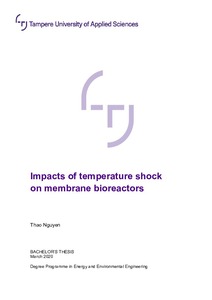Impacts of temperature shock on membrane bioreactors
Nguyen, Thao (2020)
Julkaisun pysyvä osoite on
https://urn.fi/URN:NBN:fi:amk-202004245793
https://urn.fi/URN:NBN:fi:amk-202004245793
Tiivistelmä
Operational parameters such as temperature can be a challenge for membrane bioreactors (MBRs) operated in regions with climate variations. This thesis aimed to evaluate the impacts of temperature shock on MBRs, focused on four aspects and their relationships: membrane fouling, extracellular polymeric substances (EPS), sludge characteristics and filamentous bacteria.
A laboratory-scale submerged MBR was used to demonstrate fouling tendencies in MBRs exposed to temperature shock. The MBR operated at 20oC for 18 days before the temperature was decreased to 10 ± 2oC, which was maintained for 10 days. Transmembrane pressure (TMP) was used to indicate fouling degree of the MBR. Extracellular polymeric substances (EPS) and SMP were extracted and analyzed for TOC, protein (PT) and polysaccharides (PS) concentration. Sludge characteristics and filamentous bacteria were assessed under the microscope.
The results of the experiment indicated that temperature shock had negative effects on fouling rate, regardless membrane replacement. Lower PS concentration of SMP was found after the shock, while PT concentration remained stable. Higher EPS concentration was measured in low temperature, in which majority were colloidal matters. The shock also weakened floc structure significantly, and both deflocculation and bulking were observed in the samples after the shock.
In conclusion, temperature shock is unfavorable for MBRs operation due to decreased filtration efficiency and changes in sludge characteristics. Standard methods should be developed for EPS and SMP extraction and analysis. Moreover, weakened floc structure may indicate decreased cell hydrophobicity in low temperature condition; thus, more in-depth study should be conducted concerning this hypothesis. From the fouling rate of the MBR, deflocculated sludge was concluded to have most impacts on fouling compared to bulking sludge. Conditioning strategies such as physical cleaning or dosing with coagulating reagents could be effective for fouling mitigation in MBRs operated under cold climate.
The materials for the thesis were supported by the Laboratory of Water Reclamation Engineering of Hokkaido University, under the guidance of Dr. Katsuki Kimura and Mr. Takayuki Kakuda.
A laboratory-scale submerged MBR was used to demonstrate fouling tendencies in MBRs exposed to temperature shock. The MBR operated at 20oC for 18 days before the temperature was decreased to 10 ± 2oC, which was maintained for 10 days. Transmembrane pressure (TMP) was used to indicate fouling degree of the MBR. Extracellular polymeric substances (EPS) and SMP were extracted and analyzed for TOC, protein (PT) and polysaccharides (PS) concentration. Sludge characteristics and filamentous bacteria were assessed under the microscope.
The results of the experiment indicated that temperature shock had negative effects on fouling rate, regardless membrane replacement. Lower PS concentration of SMP was found after the shock, while PT concentration remained stable. Higher EPS concentration was measured in low temperature, in which majority were colloidal matters. The shock also weakened floc structure significantly, and both deflocculation and bulking were observed in the samples after the shock.
In conclusion, temperature shock is unfavorable for MBRs operation due to decreased filtration efficiency and changes in sludge characteristics. Standard methods should be developed for EPS and SMP extraction and analysis. Moreover, weakened floc structure may indicate decreased cell hydrophobicity in low temperature condition; thus, more in-depth study should be conducted concerning this hypothesis. From the fouling rate of the MBR, deflocculated sludge was concluded to have most impacts on fouling compared to bulking sludge. Conditioning strategies such as physical cleaning or dosing with coagulating reagents could be effective for fouling mitigation in MBRs operated under cold climate.
The materials for the thesis were supported by the Laboratory of Water Reclamation Engineering of Hokkaido University, under the guidance of Dr. Katsuki Kimura and Mr. Takayuki Kakuda.
